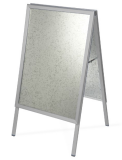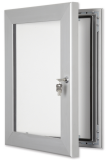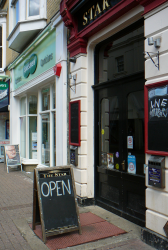


ARTICLE
- Retail Shop Advertising & VandalismShops and businesses in the high street benefit from outside advertising to attract passing trade. The problem is that such advertising material can be a magnet for destruction by the more undesirable members of society. This article exams the problem and suggests solutions.
Retail Shop Advertising and the Curse of Moronic Vandalism.

The year 2012 has already proved to be a great year for the United Kingdom, with the tremendous occasion of the Queens Diamond Jubilee, a very successful hosting of the Olympics, and an abundance of British medal success at both main Olympics and Paralympics. Culminating in a medal ranking of third in the world and top country in Europe. The Summer of 2011 was a different story, with proliferation of various race and criminal riots disgracing the English nation. This lead to wanton destruction of many shops and retail premises, and a huge cost to local businesses - some never recovered. This highlighted how vulnerable High Street premises can be from the more 'lowlife' underclass elements of society. Datalite's essay examines the issue, and provides positive information on how to eradicate the risk of destruction through the curse of moronic vandalism.

The recent Diamond Jubilee celebrations in the United Kingdom provided many moments to be proud to be British. This was to mark sixty years of outstanding service provided by Her Majesty Queen Elizabeth II. From a spectacular flotilla, a concert outside Buckingham Palace and to a well put together religious service this was Britain at its finest. The World’s eyes were watching with awe, and though the events drew huge crowds the people invariably were extremely well behaved. The only ‘complaint’ voiced by some such as the newspaper columnist Kelvin MacKenzie in the media, was that the crowds following the Diamond Jubilee celebrations were too white. That observation certainly did not apply to the contrasting events of the Politically Correct named ‘England Riots’ experienced during the Summer of 2011.
The 2011 England Riots were catalysed following the death of Mark Duggan in Tottenham. By many accounts he was a rogue, but there were at the time significant questions concerning the legality of the police action who shot him dead on 4th August 2011. As this article is being written (September 2012), apparently this Mark Duggan was carrying a loaded gun at the time of the shooting. Whether the police action was valid or not is irrelevant to this discussion. The police being human will make mistakes, but this is not a justifiable excuse for certain members of society to go on a wanton and destructive rampage. The riots started in Tottenham on 7 August 2011, and the police response was woefully inadequate, as it can be when dealing with criminal issues where ethnic minorities are involved. The author personally predicted copycat riots from the usual suspects, including Brixham, Toxteth in Livepool, Salford in Manchester, and Birmingham.
The riots were an absolute disgrace, with five deaths and over 16 others significantly injured as a result of violent acts. Over £200 million worth of property damage was inflicted, primarily shops and this is where this article focuses attention. About 1,300 businesses were affected by the riots, spectacular examples include the famous Croydon based furniture shop Reeds which was burnt to the ground, and the Sony Distribution centre which was also burnt and gutted. However, it is the utter damage and destruction from everything to glass windows, advertising displays, and the multitude of theft that affected most business owners innocently caught up with the mass rioting. The riots in England were an extreme example, but business premises and in particular shops can be vulnerable to vandalism, destruction, and theft.
The author courtesy of his service in the Royal Navy, is very well travelled. Wherever you are in the word it is a truism that you can tell the moral status of an area by the security employed by the local shops. If they are largely open, with little in the way of CCTV monitoring, and windows displaying overnight this is indicative of a ‘nice’ area. Conversely the prolific use of security, metal window shutters at night, presence of graffiti and litter together with visible vandalism - well this is an area to avoid. It is all down to the people in the area, and as the saying goes; it only takes a one or two bad apples to spoil the whole barrel.
Retail businesses
do benefit from the use of display advertising, and indeed these require to be reasonably accessible,
and hence visible to the public.
However, there are elements in society that would take advantage of such
accessibility, and the problem with crime against the retail sector appears to
be growing worse. In Ryde on the Isle of Wight, where the author is based;
there appears to be a distinct increase of ‘undesirable people’ and in recent years
vandalism to local shops has been on the increase. An Indian restaurant’s glass
frontage was smashed by a drunken yob, and even the local Co-Op Funeral parlour
has had its glass frontage smashed twice by morons. Even catching images of
these people on CCTV is often a waste of time, as many of these people lack
independent means, and hence any ability to pay for the damage they caused.
The UK is often unwilling to jail, other than for the most serious of offences
would take advantage of such
accessibility, and the problem with crime against the retail sector appears to
be growing worse. In Ryde on the Isle of Wight, where the author is based;
there appears to be a distinct increase of ‘undesirable people’ and in recent years
vandalism to local shops has been on the increase. An Indian restaurant’s glass
frontage was smashed by a drunken yob, and even the local Co-Op Funeral parlour
has had its glass frontage smashed twice by morons. Even catching images of
these people on CCTV is often a waste of time, as many of these people lack
independent means, and hence any ability to pay for the damage they caused.
The UK is often unwilling to jail, other than for the most serious of offences
One question, is it anything to do with sheer volumes of people? Probably very little, a shopping mall can be packed with people and experience little damage. Even a crowd intensive event such as a football match, say played at Charlton Athletic, does not experience much in the way of physical damage. Just a cleaning up operation after the event.
The other question is it down to availability or temptation? Back in Boxing Day 26th December 2009 shopkeeper Tom Algie to give him and his staff the day off left his shop located in Settle, North Yorkshire open all day unoccupied with an honesty box left for payment. He was delighted to return to find that not only had his customers duly paid, but all purchases were covered. A nice news story on the positive side of human nature.
The answer lies in society and culture, and the type of people in an area. Very simply in some areas of the UK there are intense concentrations of people on low incomes (i.e not working) brought up without a clear family structure or work ethic. In other words the underclass. Concentrations of such people are invariably accompanied by areas where shops are behind grills, shopkeepers behind screens, and CCTV extensively used. The types of destruction are usually readily apparent: Graffiti and litter. Furthermore shopkeepers can be on the receiving end of theft, damage, threats, abuse and other delights from the underclass fraternity. What’s worse is that the UK law appears firmly weighted in favour of the criminal and anti-social individual. To convict you need firm proof, and for shop lifting can’t even challenge until the thief is out of the shop with his or her's stolen goods.
This is the reality, what is required is a pragmatic approach to securing premises and attachments commensurate with the societal local environment. Physical security of premises needs to be protected as appropriate (CCTV, secure locking, metal shutters for vulnerable environments). However this article focuses on advertising displays.
The prime vulnerability for advertising is displaying material which is not under direct control or view of staff, such as displaying poster adverts outside, shop signs or anything that can be physically taken such as a pavement sign. It is also a truism that damage is largely mindless, items are more likely to be removed or vandalised purely through moronic often drunken action with no sensible purpose, rather than theft for gain in its traditional sense.
A dvertising
material therefore needs to be robust, and largely unbreakable. Glass is not a
good idea. A simple way of advertising outside
dvertising
material therefore needs to be robust, and largely unbreakable. Glass is not a
good idea. A simple way of advertising outside premises is by using snap
frames, these are frames that are screwed to the wall and open from the front to
swop over advertising material. Transparent plastic is normally used to protect
posters. A standard snap frame is quite easy to open, just pull open the hinged
frames - most of the undesirable characters will not be aware of this. However,
snap frames are available which can be locked, preventing this method of theft -
which could be useful if the poster itself is attractive as a souvenir.
premises is by using snap
frames, these are frames that are screwed to the wall and open from the front to
swop over advertising material. Transparent plastic is normally used to protect
posters. A standard snap frame is quite easy to open, just pull open the hinged
frames - most of the undesirable characters will not be aware of this. However,
snap frames are available which can be locked, preventing this method of theft -
which could be useful if the poster itself is attractive as a souvenir.
A step up is the use of lockable frames with extra thick framing, and to enhance advertising further lit versions are available which can be used in conjunction with timers. These solutions need to be tough commensurate with the local society, hard to remove, but easy for the retailer to change advertising. In addition outside advertising needs to be tough enough to withstand the elements such as sun-fading, damp, and inclement weather such as storms. Products that are yob proof generally find withstanding the elements a doddle!
For further information on advertising security visit: Display Products (at www.dataliteframes.co.uk).

John D Henry BA BSc, Managing Director of DATALITE UK LTD
Picture Frames and Personalised Gift Products at www.dluk.info


